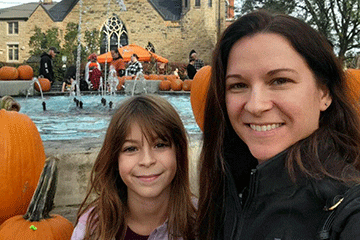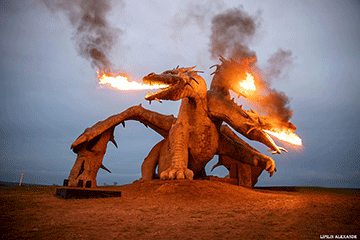Bulletin News

11/18/2022
Russia native Natalya Shatskikh feels at home every time she sees the imposing, metal Red Dragon that Scott Oldfield ’06 sculpted to greet sports fans outside of the SUNY Cortland Stadium Complex.
That’s because a sprawling park near her hometown of Lipetsk, a city of half a million residents about 250 miles southeast of Moscow, features a massive fire-breathing, copper-colored, three-headed version of SUNY Cortland’s mythical mascot dragon.
“It’s from the old folktales, the three-headed dragon,” said Shatskikh of Dryden, N.Y., one of SUNY Cortland’s approximately 225 non-traditional students, about her dueling ties on opposite sides of the world. “I know sometimes you think in life things are somehow connected.”

The senior childhood/early childhood education major is the daughter of a professor with many college-educated family members. She was 20 years old and enrolled in a teacher education program in English and French at Lipetsk State Pedagogical University 16 years ago, when she left Russia for a summer cultural immersion program in New Jersey. She never left.
“I really love being in America, the whole environment, being independent, making money,” Shatskikh said. “I had a friend from my city who took me under her wing in Ocean City, N.J., and I became a waitress.”
After lots of part-time jobs, relocations and two failed marriages, she now lives in Central New York, where she and her boyfriend and friends can help raise her daughter, Milana, a third grader. Shatskikh has joint custody with her estranged second husband as their divorce proceeds.
She worked full-time for five years at Cornell Childcare Center and still substitutes while preparing to become a certified classroom teacher.
“In the Cornell childcare Center, I have learned the specifics of American education such as paying attention to the individual needs of children,” Shatskikh said. “And having a child helped me to understand patterns of behavior and stages of development.
“I felt ready to grow, to work in a public school and earn more money.”
She completes her student teaching in fall 2023 and graduates that December.
Since starting here last fall, Shatskikh has played piano, guitar, Native American flute or ukulele in the classroom, using her musical talent to engage classmates as she conducts teaching demonstrations as part of a LIT 371 course assignment.
“Other peers could learn from my example how to integrate music and instruments to explain the phonemic awareness concept,” she said. “And Native American flute was my initiative to create an atmosphere in the classroom for everyone.”
Shatskikh has made the President’s List and currently serves as treasurer for the Non-Traditional Student Organization (NTSO). Her studies are supported by the Eda J. Kronman Scholarship for Nontraditional Students, and two stipends targeting future educators, the Angela Pace Scholarship and the Spina-Friedgen ’71 Scholarship. She recently participated in a Leadership Retreat at Raquette Lake sponsored by the SUNY Cortland Alumni Association.
Now her biggest struggle involves being almost the only Russian-born student on campus and a magnet for questions about the country’s war in Ukraine.
“The whole world is on the side of Ukraine and Russia is the aggressor,” said Shatskikh, who three years ago became an American citizen. “My whole family is still in Russia, so I’m conflicted. There’s my Russian side, my American side.
“I wanted to hide that part of me who is Russian,” said Shatskikh, who looks like a typical, American non-traditional student until she speaks Russian-accented English. “It’s bad for your mental health to hide who you are.”
Then a COR 101 program introduced her to a celebration of multicultural life and diversity, which led her to open up to the world with her talk on “Strength in Diversity and Feeling of Belonging” during the university’s Nov. 5 Diversity Conference.
“I kind of have this understanding, this appreciation, for me, for my side of the story,” Shatskikh said. “The more I talk about this, the less power it has over me.
“I’m validated. I’m heard. I’m seen and I’m valued. At the end, you have to give yourself permission. You belong. After all of the struggles, SUNY Cortland is going to support you even though there are all the struggles in the world. There will be conversations, people who are open to different perspectives.
“I don’t want there to be a single story of what Russians are,” Shatskikh said. “This girl came from Russia so there is some good in her, some hope for peace in the world.”
The university defines its non-traditional students as undergraduate students who are 24 years of age or older or, regardless of age, who may have dependent children, be working full-time, have military experience or have made a break in education at some point after high school.
The university will acknowledge these individuals Monday, Nov. 14, through Friday, Nov. 18, during its celebration of Non-Traditional Students Week.
Stories about outstanding non-traditional students will be shared during the week. The week also includes a host of special activities, both on campus and virtually.

